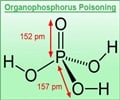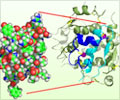A Spanish study has linked pesticide in food, water and air to type 2 diabetes risk.

These substances tend to concentrate in body fat and might be one of the reasons why obese people are more likely to develop diabetes since fat people have higher COP concentrations, according to Science Daily.
In a paper recently published in the journal Environmental Research, scientists demonstrate that people with higher concentrations of DDE - the main metabolite in the pesticide DDT - are four times more likely to develop Type 2 diabetes than other people.
"Human adipose tissue (commonly known as fat) acts as an energy reservoir and has an important metabolic function. However, adipose tissue can store potentially harmful substances, such as persistent organic pollutants," said Juan Pedro Arrebola of the research team.
COPs are a group of chemicals with diverse characteristics which are present in pesticides, industrial waste and building materials. These compounds penetrate the body not only mainly through food, but also through air or skin.
Source-IANS















